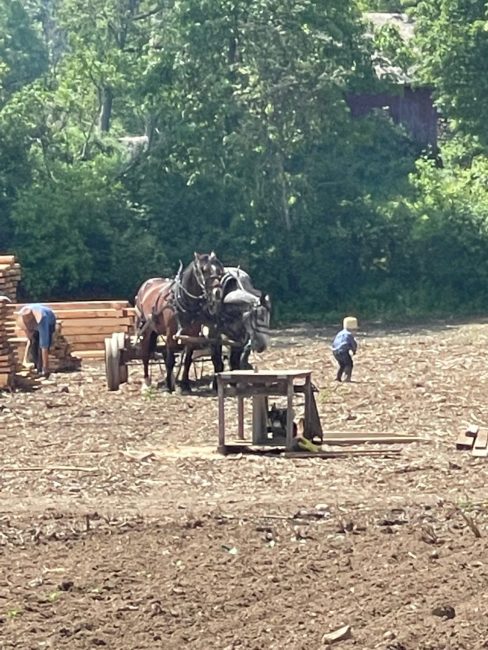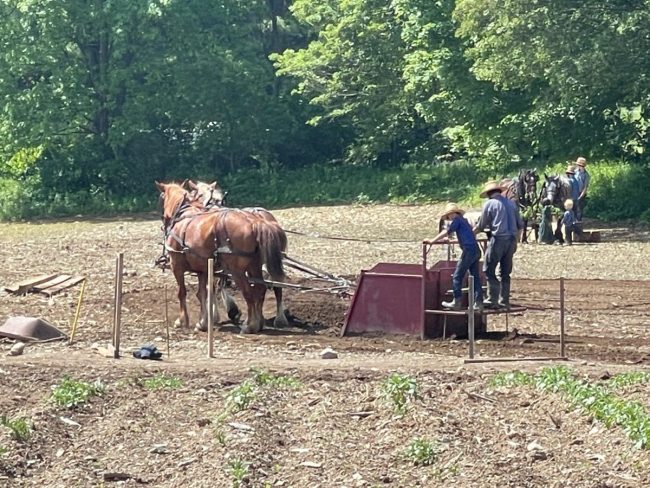I named it Miller Mountain. It was literally built in the blood and sweat of one family. Sometimes when I visit the Millers, I feel as if I wandered into a Willa Cather novel.
Over the last week, I’ve seen every member of the extended Miller family, from 18 months to 50, out in the pasture picking up rocks of different sizes that the plow horses had exploded or pulled out of the ground with their plows.
I was astonished by what I saw today, one of the hottest days on record for this date.
The family used no heavy equipment unless you include big draft horses and “rock carts” and small plows specially made for people and draft horses. They stumbled and fell many times.
It was not only essential to clear the rocks from the pasture, but they are necessary to build the barn. Everyone will be used for the barn wall, any extras will be given to other Amish families.
Moise says plowing is his favorite thing to do in the world, and he proved that this week. His son is feeling the same way.
Time and again, I saw the plows hit a rock and get stuck, the plowers nearly tip over or get caught on the big rocks that were just below the surface, all over the pasture.
Each time, someone would have to go and pull the rocks out of the ground. As you can see from the pile, there were a lot of rocks in that pasture.
The family has done this four or five times, as they plowed and tilled four different pastures. This one adjoins the home of the new barn going under construction in days.
Until today, I didn’t quite grasp just what a task it is.
If the rocks were huge, people would come together and put them in a big cart called the “rock cart.”
If they were smaller and could be lifted, they would be carried to Miller Mountain.
(I joked to Moise that in the winter, we could all ski on it, and he laughed through a cloud of pipe smoke.)
All week, I saw small children walking behind the plows trying to pick up rocks, the women in their bonnets and dressed, the men in their blue shirts and black pants and straw hats.
The small ones would gamely lean over and try to pick up rocks of any size, but the older boys and girls would rush over to dig up the rocks with them and over the mountain.
Nobody told them to be careful or stop picking up huge rocks by themselves, no one shouted or gave orders; they worked, helping one another when it was necessary.
(I’m beginning to understand the role that Tina has in the family. She watches the small children. Wherever they go, the three-year-old heeler mix goes, hobbling across the pasture on her three good feet.
She follows them if they wander and sits by them if they play in the carts. She is always with them. That’s her work.)
I never heard a complaint or moan about this grinding work. People just showed up or didn’t. There are no assigned work schedules.
Participation in the building of Miller Mountain was voluntary for everyone but Moise and his sons.
No one was nagged or cajoled into helping. No one whined or complained or tried to get out of it.
No one outside the family or in it was asked or urged to join; everybody but Moise’s wife Barbara was out there in the hot sun every day picking up rocks (using buggies with cards for the big ones) and depositing them in this mound, which has become a hill.
And she was working in front of a hot stove, making pies and donuts and cookies and banana and zucchini bread to sell.
The field is huge, and this was a monumental task, usually done by big men in huge tractors at great expense. On our farm, we hire tractors to unload a truckload of sand.
The project didn’t cost Moise a dime and took just a few days and some of the wind out of his sails.
He did look exhausted today, and I was relieved to see that he is human.
Moise is building a slant barn; it will have a basement partially underground, it will house horses, cattle, and some of his farm equipment.
Next week, Eli, a good friend of Moise’s from Canton, is coming down to oversee the barn’s construction itself. The rocks will be used for a wall and part of the foundation.
Eli will come back to supervise work on the house in September.
Moise asked me if I wanted some, I said no thanks.
Today, I was invited to come and see the progress the family had made, leveling the ground in preparation for the new permanent barn that will adjoin their new permanent house.
Moise expects both projects to be done by winter.
I guess it brought me back to frontier history books to read about families who worked so hard together to settle land and plant crops, and build houses.
Moise made everyone come into the barn and take an hour-long rest in their beds. The house was quiet while everyone rested. Moise, satisfied and exhausted, was able to sit still. Only extreme fatigue does that.
He and I talked for nearly an hour.
“Maybe when the house and barn are built,” he said, “you and I can spend more time together.”
I said I’d like that very much. It was as close as the two of us will ever get to a hug.
The picture just screamed to be taken; Moise said it was no problem. When I look at this photo, I will always think of this family, every single one working together to do a month’s work with big tractors on the outside.
The sight of it humbled me. I’m lucky to have seen this family dream come together right under my nose.




A tale that has gone on long before mechanized machinery and humbling for many I think. They are truly strong people, and I admire them all.
I can relate to this. As a teen I picked many tons of rocks from fields on our hill farm in West Rupert. The ones that were too big to pick or pull out, I used dynamite to break into smaller pieces that I could handle. The rocks were dragged on a stone boat and piled in a windrow to separate the fields from the pasture.
There is a lesson here for those that listen.
Picking rock is one of the hardest jobs on a farm. Love reading about this community.
Why did they choose land that is so untillable if they are planning to grow crops?
Price of the land?
It’s good land, their crops are doing very well with it, they’ve been farmers for centuries, they know what they are doing. Just because it takes a lot of work doesn’t mean it’s untillable or bad land. The price of the land is not my business.